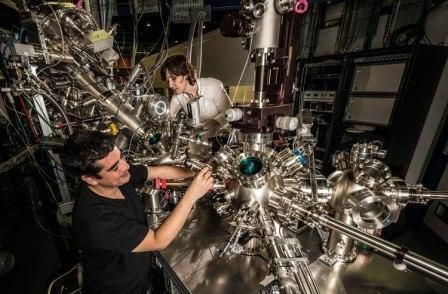
05/11/2014
New catalysts investigated with the ALBA Synchrotron
New catalysts investigated with the ALBA Synchrotron
A group of researchers, led by UPC university in Barcelona, which works on catalysts, has discovered that atoms react differently depending on the characteristics of the support that is used. Part of this study, which has been published on October 31 in the famous Science Magazine, was performed at the CIRCE beamline of ALBA Synchrotron.
The study is an important step forward in the design of new catalysts with applications in the field of energy: the catalyst investigated by the researchers contains metal (rhodium and palladium) nanoparticles and is very effective at producing hydrogen, a product that could replace fossil fuels and contribute to the energy transition.
News based on the press release issued by ALBA Synchrotron.
Image: ALBA Synchroton - Researchers Virginia Pérez-Dieste and Carlos Escudero at NAPP endstation of CIRCE beamline of ALBA Synchrotron
The study is an important step forward in the design of new catalysts with applications in the field of energy: the catalyst investigated by the researchers contains metal (rhodium and palladium) nanoparticles and is very effective at producing hydrogen, a product that could replace fossil fuels and contribute to the energy transition.
News based on the press release issued by ALBA Synchrotron.
Image: ALBA Synchroton - Researchers Virginia Pérez-Dieste and Carlos Escudero at NAPP endstation of CIRCE beamline of ALBA Synchrotron
More news
02/06/2021
Parc de l’Alba in a WHO publication on the redevelopment of contaminated sites
27/04/2021
Natura Bissé: when architecture reflects the brand identity
08/04/2021
ASTIP, the future hub for advanced research in the Barcelona Synchrotron Park
25/03/2021
4th anniversary of the setting up of Stradivarius headquarter in the Barcelona Synchrotron Park
05/03/2021
T-Systems, a leading IT service provider with a Data Centre in the Barcelona Synchrotron Park
18/02/2021
SENER participates in the Perseverance rover which is landing on Mars today









